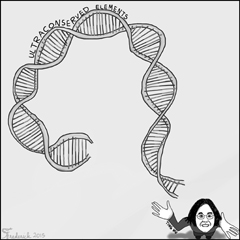
Ready to be Completely Wrong? Conjectural Genomics.
From: Robert Frederick
Series: The Conjectural
Length: 04:28
 "Ultraconserved elements" could be the most important parts of our genome, but scientists have no idea what they're for. And after a decade of studying them, Harvard's Ting Wu still wakes up every morning ready to find out that she's completely wrong.
"Ultraconserved elements" could be the most important parts of our genome, but scientists have no idea what they're for. And after a decade of studying them, Harvard's Ting Wu still wakes up every morning ready to find out that she's completely wrong.
Transcript
Reporter: Robert Frederick
The unchanged parts of our genomes are called “ultraconserved elements.” Ting Wu says scientists have no idea why they’ve been conserved, or haven’t changed. Wu is a geneticist at Harvard Medical School.
Speaker: Ting Wu
And here’s the problem: in general computational biology believes is the higher the conservation, the more important the function. So basically what this is saying is the most important parts of our genome — we have no idea about the most important parts of our genome.
Reporter: Robert Frederick
Wu was speaking before a group of science reporters at Massachusetts Institute of Technology. Usually, scientists announce discoveries with lots of reporters around.
Interviewee: Ting Wu
They are, I think some people say, “The most mysterious thing to come from the genome” because they are so puzzling.
Reporter: Robert Frederick
But instead of anno...
Read the full transcript
Intro and Outro
INTRO:Are you willing to wake up every morning prepared to be completely wrong? Scientists who study particular parts of our genome -- our D-N-A, the building blocks of life -- have to be. They have no idea what these parts of our genome are for. And yet... birds, reptiles, and mammals all have these bits of D-N-A in common -- one-hundred percent in common -- meaning these particular segments of our D-N-A haven’t changed in hundreds of millions of years. As freelance journalist Robert Frederick reports, normally, that would suggest these bits of our genome are absolutely critical to life. Turns out, though, they’re not.
OUTRO:Robert Frederick is a freelance science reporter. Find him at TheConjectural.com.
Musical Works
| Title | Artist | Album | Label | Year | Length |
|---|---|---|---|---|---|
| non-copyrighted | non-copyrighted | :00 |